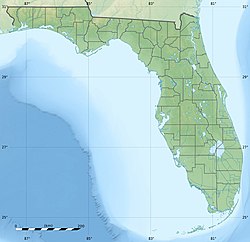Alachua Formation
| Alachua Formation | |
|---|---|
| Stratigraphic range: Early-Late Miocene (Hemingfordian-Hemphillian) ~ | |
| Type | Formation |
| Lithology | |
| Primary | Claystone, sandstone |
| Other | Phosphorite |
| Location | |
| Coordinates | 29°42′N 82°36′W / 29.7°N 82.6°W |
| Approximate paleocoordinates | 29°48′N 80°54′W / 29.8°N 80.9°W |
| Region | Florida |
| Country | |
| Type section | |
| Named for | Alachua, Florida |
The Alachua Formation is a Miocene geologic formation in Florida. The claystones, sandstones and phosphorites of the formation preserve many fossils of mammals, birds, reptiles and fish, among others megalodon.
Fossil content[edit]
The formation has provided the following fossils.[1]
Mammals[edit]
- Rodents
- Carnivora
- Amphicyon longiramus
- Borophagus orc
- B. pugnator
- Cynelos caroniavorus
- Enhydritherium terraenovae
- Epicyon haydeni
- E. saevus
- Eucyon davisi
- Euoplocyon spissidens
- Leptarctus ancipidens
- Metatomarctus canavus
- Oligobunis floridanus
- Osbornodon iamonensis
- Phoberocyon johnhenryi
- Zodiolestes freundi
- Borophagus sp.
- Phlaocyon sp.
- Sthenictis sp.
- Felidae indet.
- Mustelinae indet.
- Ground sloths
- Gomphotheres
- Artiodactyls
- Aepycamelus major
- Diabolocornis simonsi
- Floridachoerus olseni
- Floridameryx floridanus
- Floridatragulus dolichanthereus
- Hemiauchenia minima
- Machaeromeryx gilchristensis
- Nothokemas floridanus
- Parablastomeryx floridanus
- Pediomeryx hemphillensis
- Prosynthetoceras texanus
- Synthetoceras australis
- S. cf. tricornatus
- Yumaceras hamiltoni
- Aepycamelus sp.
- Hemiauchenia sp.
- Merycoidodon sp.
- Antilocapridae indet.
- Camelidae indet.
- Ruminantia indet.
- Tayassuidae indet.
- Tayassuinae indet.
- Soricomorpha
- Perissodactyls
- Anchitherium clarencei
- Aphelops malacorhinus
- A. mutilus
- Archaeohippus blackbergi
- Calippus elachistus
- Calippus hondurensis
- Calippus maccartyi
- Cormohipparion emsliei
- C. ingenuum
- C. plicatile
- Floridaceras whitei
- Menoceras barbouri
- Nannippus aztecus
- N. morgani
- N. westoni
- Neohipparion trampasense
- Parahippus leonensis
- Protohippus gidleyi
- Pseudhipparion skinneri
- Tapirus webbi
- Teleoceras proterum
- Hipparion cf. tehonense
- cf. Astrohippus sp.
- Dinohippus sp.
- Sirenians
- Lipotyphla
- Theriiformes
Birds[edit]
Reptiles[edit]
- Turtles
- Crocodiles
- Snakes
- Anilioides minuatus
- Boa constrictor
- Calamagras floridanus
- Ogmophis pauperrimus
- Paraoxybelis floridanus
- Pseudocemophora antiqua
- Pterygoboa sp.
- Lizards
Amphibians[edit]
- Anurans
- Salamanders
Fish[edit]
- Sharks
- Rays
- Others
See also[edit]
References[edit]
- ^ Alachua Formation at Fossilworks.org
Bibliography[edit]
- C. Pimiento. 2014. Carcharocles megalodon unpublished collections from Natural History Museums around the world
- Hulbert, Richard C., Jr. (1988). "Calippus and Protohippus (Mammalia, Perissodactyla, Equidae) from the Miocene (Barstovian-early Hemphillian) of the Gulf Coastal Plain" (PDF). Bulletin of the Florida State Museum, Biological Sciences. 32 (3): 221–340.
{{cite journal}}: CS1 maint: multiple names: authors list (link) - Webb, S. David; MacFadden, Bruce J.; Baskin, Jon A. (May 1981). "Geology and paleontology of the Love Bone Bed from the Late Miocene of Florida" (PDF). American Journal of Science. 281: 513–544.
- Hirschfeld, Sue E.; Webb, S. David (1968). "Plio-Pleistocene Megalonychid Sloths of North America" (PDF). Bulletin of the Florida State Museum. 12 (5): 213–296.
- Webb, S. David (August 1966). "A Relict Species of the Burrowing Rodent, Mylagaulus, from the Pliocene of Florida". Journal of Mammalogy. 47 (3): 401–412. JSTOR 1377681.
- Auffenberg, Walter (1963). "Fossil testudinine turtles of Florida: genera Geochelone and Floridemys" (PDF). Bulletin of the Florida State Museum, Biological Sciences. 7 (2): 53–97.
- Pirkle, E. C. (December 1956). "The Hawthorne and Alachua Formations of Alachua County, Florida". Quarterly Journal of the Florida Academy of Sciences. 19 (4): 197–240. JSTOR 24315224.
- White, T. E. (1942). "The Lower Miocene mammal fauna of Florida". Bulletin of the Museum of Comparative Zoology. 92 (1): 1–49.
- Simpson, George Gaylord (1930). "Tertiary Land Mammals of Florida". Bulletin of the American Museum of Natural History. 59 (3): 1–64.


